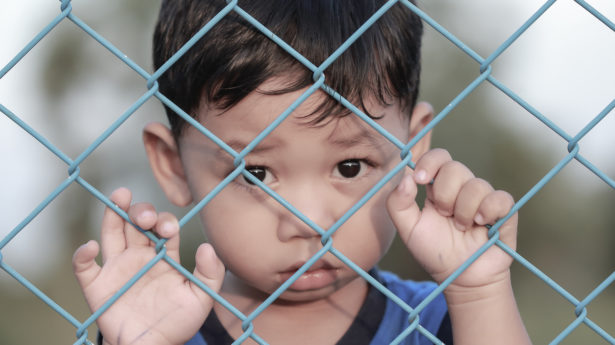The Unitarian Universalist Service Committee advances human rights through grassroots collaborations.
Two Years After Atrocities, Companies Still Profiting From Genocide in Burma

By on August 26, 2019
A History of Violence
August 25 marked two years to the day since the Burmese military forcibly expelled nearly 850,000 Rohingya people from their homes, deploying arson, gunfire, and sexual violence as weapons of war. These atrocities were the culmination of a decades-long process of discrimination and exclusion against the Rohingya people – a Muslim ethnic group from northern Burma* – who have long faced injustice at the hands of their government. New documentation published by the United Nations demonstrates how foreign governments and transnational companies are enabling these long-standing abuses of power.
Human rights violations against the Rohingya did not begin with the most recent wave of atrocities. In 2012, state-abetted communal violence in Rakhine State displaced more than 120,000 Rohingya people within the country’s borders. To this day, internally displaced Rohingya live in apartheid conditions in camps where their basic rights are denied.
The Burmese military’s campaign against the Rohingya in August 2017 escalated these crimes into outright ethnic cleansing and genocide. In operations carried out by the Tatmadaw —the official name for Burma’s military—thousands of Rohingya people were killed and nearly a million were driven across the country’s border into neighboring Bangladesh. The vast majority remain in refugee camps where they are struggling to access education and other rights.
Primary culpability lies with Burma’s leading military officials who ordered these acts, which they described as “clearance operations” meant to retaliate against a small armed group in Rakhine.
Funding Human Rights Abuses
To the extent the international community continues to do business with Burma’s military, however, it is complicit in these crimes. In recent weeks, evidence has mounted that trade with international actors is enabling the Burmese military to commit gross human rights violations—not only against the Rohingya, but against ethnic nationalities in other parts of the country as well, including the Shan and Kachin peoples.
On August 5, the United Nations Fact-Finding Mission on Myanmar released a groundbreaking report, documenting the extensive web of economic ties the Burmese military uses to fund its human rights violations. This web includes both large military-owned conglomerates and smaller Tatmadaw-linked businesses known as “crony companies,” which also channel funds into military coffers.
Citing evidence that foreign governments and transnational companies conduct arms-sales and other business with military-owned entities in Burma, the report finds these transactions enable the Tatmadaw to fund its operations without relying on the country’s civilian government. This contributes to the Burmese military’s dangerous autonomy from most forms of civilian oversight, which in turn undermines the country’s attempted transition to democracy.
Advocacy organization Burma Campaign UK has also just released an updated version of its “Dirty List” of global companies doing business with the Burmese military. The list now includes a number of major U.S.-based corporations, including well-known tech giants that host Tatmadaw-owned accounts and apps on their web platforms, and a major financial services company, Western Union, which allegedly contracts with a bank in Burma owned by one of the two main Tatmadaw conglomerates.
How the U.S. Government Can Help
Because of these ties to U.S. companies, our government has the power to help cut off the flow of funds to the Burmese military. It can accomplish this through targeted sanctions on military officials and the companies and assets they control. These sanctions could be imposed either through legislation such as the Burma Human Rights and Freedom Act (S.1186), or at the discretion of the executive branch, using powers already available to them under the Global Magnitsky Act.
The executive branch’s steps in this direction so far, however, have been woefully inadequate. While restrictions the State Department imposed earlier this summer on the travel of Burmese military officials were a welcome step, they are far from sufficient to ensure accountability. Moreover, they do not halt any key funding stream to Burma’s military forces. Our hopes turn to Congress, therefore, which will take up targeted sanctions provisions as amendments to a must-pass spending bill, once it returns from the August recess.
Many human rights advocates rightly express concerns about using sanctions as a policy tool. UUSC shares their viewpoint and takes seriously these fears. In many parts of the world, the use of large-scale sanctions has been destructive of human rights, enabling authoritarian governments to tighten their grip on power while harming ordinary citizens who have done nothing wrong.
Targeted sanctions against Burmese military officials and Tatmadaw-owned businesses, however, would have a very different effect. As a whole, profits flowing to the Burmese military are harming rather than helping Burma’s economy. These funding streams are benefitting only a few and enabling the Tatmadaw to continue longstanding practices of land-theft and mineral extraction in territories populated by the country’s ethnic minorities—practices that deplete shared resources and set back the country’s long-term collective prosperity.
In Rakhine State, these profits are enabling the Burmese military to build new settlements and development projects over the remains of destroyed Rohingya villages.The military and the companies profiting alongside them are trying to erase evidence the Rohingya people even existed. In this way, they aim to consolidate and reap profits from the crime of genocide.
Such policies are far from a path to equitable development in Burma. True social and economic wellbeing can only come through isolating military businesses responsible for human rights violations, while investing more deeply in private and civilian-owned sectors of the economy. As UUSC’s partners the Burma Human Rights Network urge in a recent report: “[The] United States should further deploy targeted sanctions against the military and their cronies for participation in atrocities, oppression of minorities, creation of religious turmoil, and undermining democratic principles.” We will continue to work to achieve this goal.
* UUSC and our partners generally refer to the country as Burma, as the current official designation of Myanmar dates back to 1989, when a military junta renamed the country after brutally suppressing the Burmese pro-democracy movement. We use Burma, therefore, rather than Myanmar, as a way to express our solidarity with the Burmese people’s long struggle for freedom from military rule. Both terms are romanizations of the same root word.
Photo Credit: iStock – Michał Fiałkowski
***
About UUSC: Guided by the belief that all people have inherent worth and dignity, UUSC advances human rights globally by partnering with affected communities who are confronting injustice, mobilizing to challenge oppressive systems, and inspiring and sustaining spiritually grounded activism for justice. We invite you to join us in this journey toward realizing a better future!

